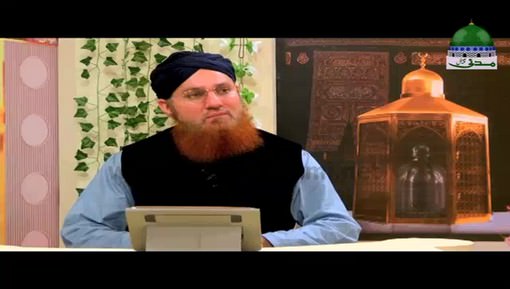New Writer
Makka and Madina in the Quran
Aakif Attari
(Dawra Hadith, Jamia tul-Madina, Faizan e Madina, Faisalabad)
Makka and Madina—may Allah increase their status—are auspicious locations in which the Prophet صَلَّى الـلّٰـهُ عَلَيْهِ وَاٰلِهٖ وَسَلَّم lived. His presence rendered them loci of unbound blessings and brimming sources of peace for the hearts. It is no wonder then that the Quran highlights their virtues.
1. The First House:
اِنَّ اَوَّلَ بَیْتٍ وُّضِعَ لِلنَّاسِ لَلَّذِیْ بِبَكَّةَ مُبٰرَكًا وَّ هُدًى لِّلْعٰلَمِیْنَۚ(۹۶)
“Indeed, the first house which was established as a place of worship for the people is the one which is in Makka (the Kaʿba); blessed and a guide to the entire world.”[1]
The Jews would say, “Our Qibla, Jerusalem, is superior to the Kaʿba as it was the Qibla of the previous Prophets عَـلَـيْهِمُ السَّلَام and older than the Kaʿba.” The above-mentioned verse corrects their gross misunderstanding[2] by revealing that the Kaʿba was the first house of worship on earth.
2. Recourse for Humankind:
وَ اِذْ جَعَلْنَا الْبَیْتَ مَثَابَةً لِّلنَّاسِ وَ اَمْنًاؕ-وَ اتَّخِذُوْا مِنْ مَّقَامِ اِبْرٰهٖمَ مُصَلًّىؕ-وَ عَهِدْنَاۤ اِلٰۤى اِبْرٰهٖمَ وَ اِسْمٰعِیْلَ اَنْ طَهِّرَا بَیْتِیَ لِلطَّآىٕفِیْنَ وَ الْعٰكِفِیْنَ وَ الرُّكَّعِ السُّجُوْدِ(۱۲۵)
And recall when We made this House (i.e. the Ka'bah) a focal point for the people and a place of safety. And make the standing place of Ibrahim (maqām Ibrāhīm) a station for salah, and We emphasised to Ibrahim and Isma'il that ˹they must˺ purify My House well for those who perform tawaf (circumambulation), and those who perform iʿtikaf (i.e. the devotional seclusion in a Mosque), and those who bow down and prostrate.[3]
Al-Bayt refers to the Kaʿba and includes the entire Sacred Sanctuary (ḥaram). Mathāba is a place of continuous return. Muslims continuously return to this place to perform Hajj and Umrah. Making the place a sanctuary means it is forbidden to murder and kill in it.[4] The station of Ibrāhīm mentioned in this verse is the stone which Prophet Ibrāhīm عَـلَيْـهِ الـسَّـلاَم stood on during the construction of the Kaʿba. As a result, his footprints are imprinted on it. Praying next to it is virtuous and recommended (mustaḥabb).[5]
1. An Oath by Makka:
لَاۤ اُقْسِمُ بِهٰذَا الْبَلَدِۙ(۱) وَ اَنْتَ حِلٌّۢ بِهٰذَا الْبَلَدِۙ(۲)
“I swear an oath by this city (Makka). That (because) O Beloved, you are present in this city.”[6]
In other words, “Dear beloved! صَلَّى الـلّٰـهُ عَلَيْهِ وَاٰلِهٖ وَسَلَّم I swear by the city of Makka, for you are in it. Makka has attained this greatness only because of your presence in it.”[7]
Radiant Madina in the Quran:
1. A Venerated Place:
وَ الَّذِیْنَ هَاجَرُوْا فِی اللّٰهِ مِنْۢ بَعْدِ مَا ظُلِمُوْا لَنُبَوِّئَنَّهُمْ فِی الدُّنْیَا حَسَنَةًؕ-وَ لَاَجْرُ الْاٰخِرَةِ اَكْبَرُۘ-لَوْ كَانُوْا یَعْلَمُوْنَۙ(۴۱)
“And to those who left their homes and families in Allah's cause having been oppressed; We shall definitely give them a good place in the world. And the reward of the Hereafter is indeed extremely great; had somehow people known.”[8]
“A good place” refers to Madina, which Allah Almighty created as a place of migration for them. Thus, we come to know of the virtue of Madina, as it has been declared a “good place.”[9]
2. The House of Faith:
وَ الَّذِیْنَ تَبَوَّؤُ الدَّارَ وَ الْاِیْمَانَ مِنْ قَبْلِهِمْ
“And those ˹Anṣār˺ who made homes in this city (of Madina) and in faith (became Muslims) before (the arrival of) the Muhājirūn.”[10]
This verse praises the Anṣār and refers to those who accepted faith before the Muhājirūn or the arrival of the Muhājirūn and even before the arrival of the Prophet صَلَّى الـلّٰـهُ عَلَيْهِ وَاٰلِهٖ وَسَلَّم in Madina.[11]
May Allah Almighty enable us to visit those sacred lands and reap their blessings. Āmīn.
[1] [Kanz-ul-Iman (translation of Quran)] (Part 4, Surah Aal Imran, verse 96)
[2] Khaza’in, Aal Imran, verse 96, vol. 1, p. 274
[3] [Kanz-ul-Iman (translation of Quran)] (Part 1, Surah al-Baqarah, verse 125)
[4] Madarik, Al-Baqarah, verse 125, p. 77
[5] al-Baydawi, al-Baqarah, verse 125, vol. 1, p. 398
[6] [Kanz-ul-Iman (translation of Quran)] (Part 30, Surah al-Balad, verses 1 - 2)
[7] Sirat ul Jinaan, vol. 10, pp. 678 - 679
[8] [Kanz-ul-Iman (translation of Quran)] (Part 14, Surah al-Nahl, verse 41)
[9] Sirat ul Jinaan, vol. 5, p. 318
[10] [Kanz-ul-Iman (translation of Quran)] (Part 28, Surah al-Hashr, verse 9)
[11] Sirat ul Jinaan, vol. 10, p. 73



















Comments